Unit 7 Will people have robots 单元清
Unit7Willpeoplehaverobots单元知识精讲人教版英语八年级上册

Unit 7 Will people have robots?八年级上册单元知识精讲【单元学习目标】1.语言能力:能围绕相关主题,运用所学语言,与他人进行日常交流,语音、语调、用词基本正确,表达比较连贯;2.文化意识:对具有文化多样性的活动和事物持开放心态;3.思维品质:能发现语篇中事件的发展和变化,辨识信息之间的相关性,把握语篇的整体意义;4.学习能力:主动学习并积极使用现代信息技术,具备初步的信息素养。
【单元思维导图】【单元知识梳理】1. 重点单词paper n. 纸pollution n. 污染;污染物prediction n. 预测future n. 未来pollute v. 污染environment n. 环境planet n. 行星earth n. 地球;泥土plant v. 种植 n. 植物part v. 参加 n. 部分peace n. 和平sky n. 天空astronaut n. 宇航员apartment n. 公寓房间rocket n. 火箭space n. 空间;太空even adv. 甚至;愈加human adj. 人的 n. 人;人类servant n. 仆人dangerous adj. 危险的already adv. 已经factory n. 工厂believe v. 相信disagree v. 不同意shape n. 形状fall v. /n. 倒塌;跌倒possible adj. 可能的probably adv. 大概;或许;很可能holiday n. 假日word n. 单词2. 重点短语on puters 在电脑上on paper 在纸上free time 空闲时间in danger 在危险中on the earth 在世界上play a part in sth. 在某方面出力/做贡献space station 太空站look for 寻找puter programmer 电脑程序师in the future 在将来hundreds of 成百上千的the same…as 与……一样over and over again 反复get bored 无聊wake up 醒来/唤醒look like 看起来像fall down 倒下/落下3. 重点句型Everything will be free.Will people have robots?What will the future be like?There will be more pollution.There will be less free time/fresh water.We can use less water and plant more trees.Everyone should play a part in saving the earth.Books will only be on puters, not on paper.In 50 years, people will have more free time because there will be less things to do. You should also remember that there will be both good and bad things in life.【单元易混易错】1.一般将来时(1)含义:一般将来时表示将来某个时间要发生的动作或存在的时态,也表示将来经常或反复发生的动作。
Unit 7 Will people have robots知识点归纳
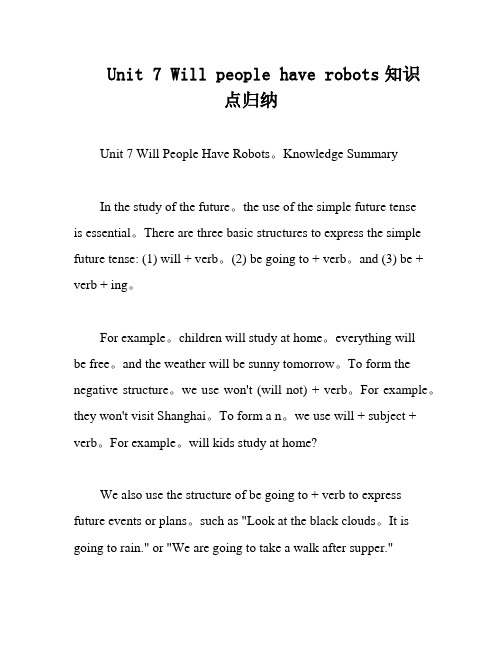
Unit 7 Will people have robots知识点归纳Unit 7 Will People Have Robots。
Knowledge SummaryIn the study of the future。
the use of the simple future tenseis essential。
There are three basic structures to express the simple future tense: (1) will + verb。
(2) be going to + verb。
and (3) be + verb + ing。
For example。
children will study at home。
everything willbe free。
and the weather will be sunny tomorrow。
To form the negative structure。
we use won't (will not) + verb。
For example。
they won't visit Shanghai。
To form a n。
we use will + subject + verb。
For example。
will kids study at home?We also use the structure of be going to + verb to express future events or plans。
such as "Look at the black clouds。
It is going to rain." or "We are going to take a walk after supper."nally。
we use the present continuous tense (be + verb + ing) for certain verbs that indicate an n that will happen in the future。
八年级英语上册Unit7Willpeoplehaverobots知识点归纳(新版)
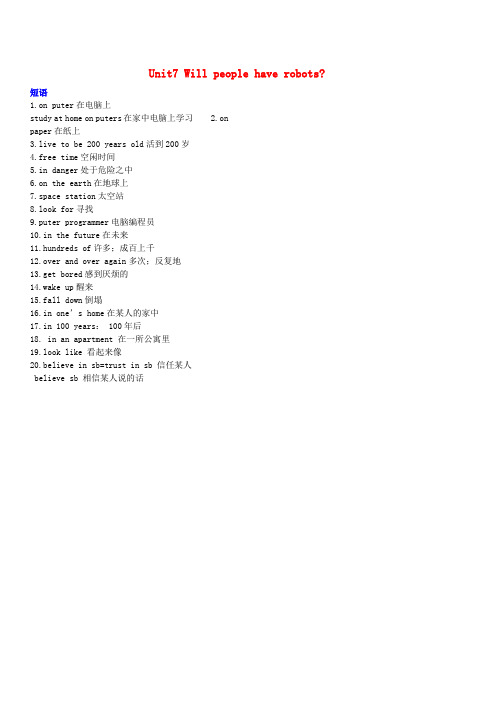
Unit7 Will people have robots?短语1.on puter在电脑上study at home on puters在家中电脑上学习 2.onpaper在纸上3.live to be 200 years old活到200岁4.free time空闲时间5.in danger处于危险之中6.on the earth在地球上7.space station太空站8.look for寻找9.puter programmer电脑编程员10.in the future在未来11.hundreds of许多;成百上千12.over and over again多次;反复地13.get bored感到厌烦的14.wake up醒来15.fall down倒塌16.in one’s home在某人的家中17.in 100 years: 100年后18. in an apartment 在一所公寓里19.look like 看起来像20.believe in sb=trust in sb 信任某人believe sb 相信某人说的话用法:1.will+动词原形将要做……2.fewer/more+可数名词复数更少/更多……less/more+不可数名词更少/更多……3.have to do sth.不得不做某事(客观) must 必须(主观)5.There will be + 主语+其他将会有……6.There is/are +sb./sth.+doing sth.有……正在做某事7.make sb. do sth. 8.help sb. with sth.帮助某人做某事9.What will the future be like ? 未来将会是什么样子?10.Which side do you agree with ?你同意哪一方的观点?。
Unit7WillpeoplehaverobotsSectionB3aSelfCheck大单元教学课

第二课时
熟练掌握重点词汇和句型;学会用所学单词和句型谈论环保话题和未来生活;掌握本单元语言结构的特点和规律。
通过小组合作的讨论及最后的展示,检测学生阶段性学习成果,让学生自行总结归纳,并做最后的汇报展示,由其他成员进行补充质疑和互评,左后再由教师进行整体评价。
Section B 1a1e
听说课
What things are mentioned ?
学生活动2
Answer the questions .
活动意图说明:
导入写作范文并引导学生关注和分析篇章结构,从而理清写作思路。
环节三:Activity3
教的活动3
1.Read Jill’s answer to the question “What will your life be like in the future ? Fill in the blanks with the words in the box.
Unit 7 Will people have robots?单元整体教学设计
单元主题意义
本单元的主题是人与社会,涉及的话题是社会进步与人类文明、科技发展与技术创新,以及科学精神与对未来的畅想。
单元教学目标
通过本单元的学习,学生能够:
目标a:能听懂关于预测未来生活的简短对话,用英语对未来做预测;能读懂对未来生活的描述。
整体教学思路及教学结构图
1.来源&内容:
本单元是《新目标英语》系列教材之一Go for it !八年级上册的第七单元。本单元围绕“谈论未来世界和未来生活”这个话题,呈现了一般将来时的句型以及there be句型的一般将来时的用法。通过设计形式多样的教学活动,让学生学会使用一般将来时对未来世界进行描述或预测,并进一步提高听、说、读、写的综合能力。
Unit7 Will people have robots 单元整体计划

Unit 7 Will people have robots 单元整体设计一、教学目标语言能力:掌握与未来、职业、交通、居住场所及机器人发展等相关话题的词汇,并能在实际情境中运用。
理解并能够正确使用一般将来时态描述未来的情境和预测。
文化意识:了解未来生活可能带来的文化变化,培养跨文化交流的意识。
理解并尊重不同文化背景下的未来预测和生活方式。
思维品质:通过分析和对比过去、现在与未来的生活,培养学生的批判性思维能力。
鼓励学生对未来发展进行预测,培养其创新思维和想象力。
学习能力:培养自主学习的能力,通过提供相关资源,让学生能够独立探索和学习关于未来的主题。
训练学生通过合作学习进行讨论和分享,提高其协作学习的能力。
二、教学内容及步骤学习理解导入:目的:激发学生的学习兴趣和对未来主题的关注。
内容:播放一段关于未来生活的短片,展示未来可能出现的场景和科技。
引导学生讨论和分享他们对未来的想法和预测。
Section A听说部分:(1)词汇学习:目的:帮助学生掌握与未来主题相关的基本词汇。
内容:讲解“机器人”、“自动化”、“未来主义”等词汇的定义、例句和用法。
通过小组活动,让学生使用这些词汇进行造句或简短对话。
(2)听力活动:目的:培养学生的听力理解能力,并让他们熟悉关于未来生活的不同观点和情境。
内容:播放一段关于未来生活情境的听力材料。
设计选择题、填空题等,检查学生是否理解听力内容。
引导学生分享他们从听力中获取的信息和感受。
(3)口语练习:目的:鼓励学生表达对未来生活的看法和预测,提高其口语表达能力。
内容:设计一个关于未来生活的主题讨论,如“我心目中的未来城市”、“未来职业的发展趋势”等。
组织学生进行小组讨论,鼓励他们积极发表自己的观点,并从课本和教师提供的资源中寻找支撑证据。
在讨论后,邀请几个小组代表上台分享他们的想法。
应用实践Section B知识技能部分:(1)语法聚焦:目的:让学生掌握一般将来时的基本结构和用法,能够在口语和书面语中正确运用。
八年级英语上册 Unit 7 Will people have robots(1a-2c)教材分析
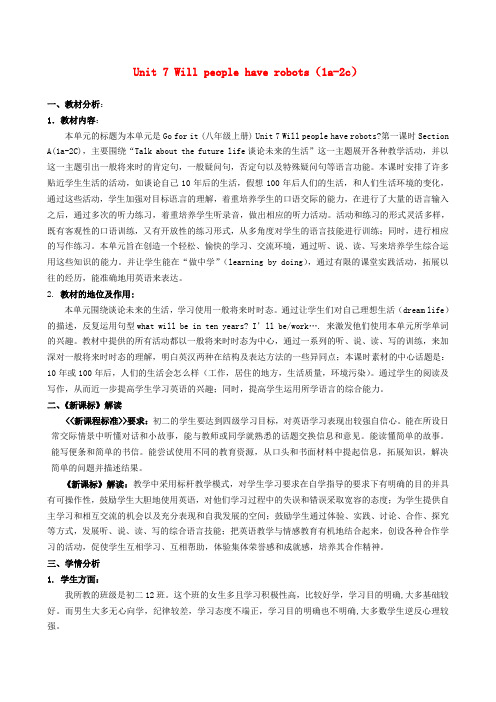
Unit 7 Will people have robots(1a-2c)一、教材分析:1.教材内容:本单元的标题为本单元是Go for it (八年级上册) Unit 7 Will people have robots?第一课时Section A(1a-2C),主要围绕“Talk about the future life谈论未来的生活”这一主题展开各种教学活动,并以这一主题引出一般将来时的肯定句,一般疑问句,否定句以及特殊疑问句等语言功能。
本课时安排了许多贴近学生生活的活动,如谈论自己10年后的生活,假想100年后人们的生活,和人们生活环境的变化,通过这些活动,学生加强对目标语言的理解,着重培养学生的口语交际的能力,在进行了大量的语言输入之后,通过多次的听力练习,着重培养学生听录音,做出相应的听力活动。
活动和练习的形式灵活多样,既有客观性的口语训练,又有开放性的练习形式,从多角度对学生的语言技能进行训练;同时,进行相应的写作练习。
本单元旨在创造一个轻松、愉快的学习、交流环境,通过听、说、读、写来培养学生综合运用这些知识的能力。
并让学生能在“做中学”(learning by doing),通过有限的课堂实践活动,拓展以往的经历,能准确地用英语来表达。
2. 教材的地位及作用:本单元围绕谈论未来的生活,学习使用一般将来时时态。
通过让学生们对自己理想生活(dream life)的描述,反复运用句型what will be in ten years? I’ll be/work…. 来激发他们使用本单元所学单词的兴趣。
教材中提供的所有活动都以一般将来时时态为中心,通过一系列的听、说、读、写的训练,来加深对一般将来时时态的理解,明白英汉两种在结构及表达方法的一些异同点;本课时素材的中心话题是:10年或100年后,人们的生活会怎么样(工作,居住的地方,生活质量,环境污染)。
通过学生的阅读及写作,从而近一步提高学生学习英语的兴趣;同时,提高学生运用所学语言的综合能力。
(完整word版)Unit7willpeoplehaverobots知识点,推荐文档
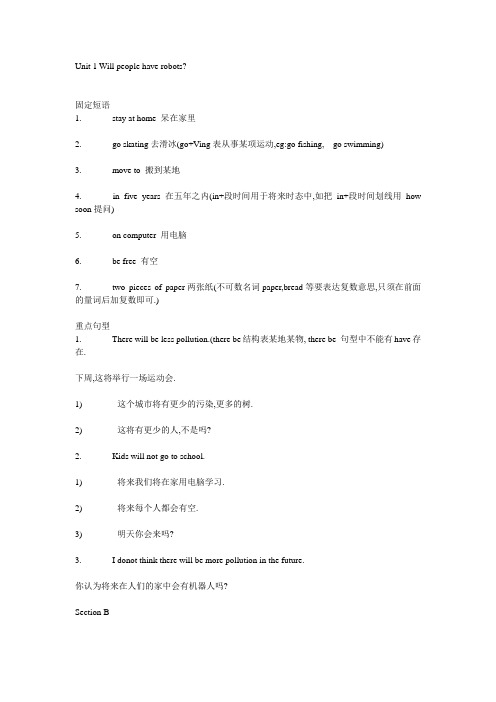
Unit 1 Will people have robots?固定短语1. stay at home 呆在家里2. go skating去滑冰(go+Ving表从事某项运动,eg:go fishing, go swimming)3. move to 搬到某地4. in five years 在五年之内(in+段时间用于将来时态中,如把in+段时间划线用how soon提问)5. on computer 用电脑6. be free 有空7. two pieces of paper两张纸(不可数名词paper,bread等要表达复数意思,只须在前面的量词后加复数即可.)重点句型1. There will be less pollution.(there be结构表某地某物, there be 句型中不能有have存在.下周,这将举行一场运动会.1) 这个城市将有更少的污染,更多的树.2) 这将有更少的人,不是吗?2. Kids will not go to school.1) 将来我们将在家用电脑学习.2) 将来每个人都会有空.3) 明天你会来吗?3. I donot think there will be more pollution in the future.你认为将来在人们的家中会有机器人吗?Section B固定短语1. live in an apartment 住在公寓里2. will be a/an ~ 成为---人3. take a train to school 乘火车去上学(take~to~. 乘~去~地.)4. in the daytime 在白天5. on the weekend 在周末6. fall in love with(fall--fell) 爱上某人7. be able to do sth =can do sth能够~~8. on vacation渡假9. keep a pet 养宠物1. 在人们的家中in people’s home2. 在家中通过电脑学习study at home on the computer3. 活到200岁live to be 200 years old4. 100年以后in 100 years=100 years from now5. 免费的be free6. 在全世界in the whole world7. 希望如此。
Unit7 Will people have robots 单元全部授课课件

won’t No, they ______.
They _______ ’ll study at home on computers.
- 新世纪教育网版权所有
In 3000, you won't carry a backpack. It will carry you.
- 新世纪教育网版权所有
In 10 years, I think I will be a/an _______. I will live in ________. _____________________________________. I think I will have a bright future.
- 新世纪教育网版权所有
have
live in
live to 200 years old
use
play ball
- 新世纪教育网版权所有
Hale Waihona Puke study at home on computers
Will people use money in 100 years? Yes, they will./No, they won’t.
1b Listen and circle the predictions you hear in 1a.
- 新世纪教育网版权所有
Listen again and fill in the blanks.
Boy 1: I don’t think people _______ will use money. will be free. I bet kids Probably everything ______ won’t ’ll study at home _____go to school. They _______ on computers. Boy 2: I think people ________ will have robots in their homes ___ in 100 years. I ____ saw a robot on TV, and it _______ cleaned the kitchen. There ______ will be only one country and there will always be schools.
人教版八年级英语上册第七单元知识点

人教版八年级英语上册第七单元知识点Unit 7 Will people have robots?一.重点词汇讲解1.paper n. 纸张,纸该词为不可数名词,表示“一张纸”是a piece of paperpaper n. 试卷此时为可数名词2.pollution n. 污染,污染物不可数名词water pollution 水污染air pollution 空气污染pollute v. 污染,玷污polluted adj. 受污染的,被玷污的3.prediction n. 预测,预言predict v. 预测4.environment n. 环境environmental adj. 环境的5.part n. 部分[常见搭配]play a part in sth/doing sth 参与;发挥作用;扮演角色例如:Parents usually play a part in their kids’ decisions.父母经常在孩子做决定这件事情上会发挥作用。
6.space n. 空间,太空[辨析] space & roomspace 指“(个人)空间,太空”时,是不可数名词,指“空地,余地,间隔”时,既可以作不可数名词,也可以作可数名词。
room指为某一目的所需的空间,侧重大小,尺寸等时,是不可数名词。
而指“房间”的含义时,是可数名词。
[注意]表示“空地,空间”时,space 和room可以互换。
7.dangerous adj. 危险的,不安全的safe adj. 安全的danger n. 危险safety n. 安全[常见搭配] be in (great) danger 处于(极大的)危险中8.such adj. & pron. 这样的,如此,这样[辨析] such & sosuch 是形容词,修饰名词。
常见结构有:(1)such +a/an + adj. +单数可数名词+that 从句。
Unit 7 Will people have robots (全单元课件)-013016280

如果你要去其他国家,你可以自己开车去。
After 100 years, if you want to go to another country, you’ll be able to drive there.
需要更完整的资源请到 新世纪 教育网 -
需要更完整的资源请到 新世纪 教育网 -
Free
People won’t use money. Everything will be free.
需要更完整的资源请到 新世纪 教育网 -
Books will only be on computers, not on paper.
需要更完整的资源请到 新世纪 教育网 -
3. Books will only be on computers, not on paper. ____A ___D
4. Kids won’t go to school. They’ll study at home on computers. ____A ___D
衣服能自动换成时新样式
需要更完整的资源请到 新世纪 教育网 -
in the future
Yeah!
People will have robots in their homes.
需要更完整的资源请到 新世纪 教育网 -
Language Goal:
需要更完整的资源请到 新世纪 教育网 -
A B. C default. 12 + =? ?。。。
Kids won’t go to school. They’ll study at home on computers.
需要更完整的资源请到 新世纪 教育网 -
Unit 7 Will people have robots (全单元)-3
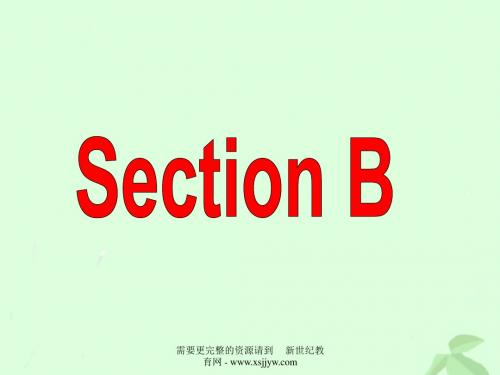
Where do you l育网 -
I lived in a house in the country.
Where did you live ten years ago?
I will live in the space station.
需要更完整的资源请到 新世纪教 育网 -
Write each word in the correct 1a column below.
astronaut house apartment train rocket space station computer programmer
需要更完整的资源请到 新世纪教 育网 -
1e
Student A is Alexis and Student B is Joe. Talk about Joe’s life now, 10 years ago and 10 years from now.
I live in an apartment.
需要更完整的资源请到 新世纪教 育网 -
8. believe v. 相信;认为有可能 believe sb. 相信某人说的话 believe + that 从句
需要更完整的资源请到 新世纪教 育网 -
7. disagree v. 不同意 ;持不同意见; 有分歧 前缀(dis) + agree (同意)→disagree
e.g. My father agrees, but my mother disagrees. 我爸爸同意,但我妈妈不同意。
需要更完整的资源请到 新世纪教 育网 -
A farmer lives in a house. He walks to the farm.
- 1、下载文档前请自行甄别文档内容的完整性,平台不提供额外的编辑、内容补充、找答案等附加服务。
- 2、"仅部分预览"的文档,不可在线预览部分如存在完整性等问题,可反馈申请退款(可完整预览的文档不适用该条件!)。
- 3、如文档侵犯您的权益,请联系客服反馈,我们会尽快为您处理(人工客服工作时间:9:00-18:30)。
一般将来时
• 一、概念:表示将来某个时间要发生的动作或存在的状态,也表示将来经常或反复发生的 动作,常与表示将来的时间状语连用,如tomorrow,next week,next year,in the future 等。 I will go back to my hometown next week.下周我将回家乡。 二、构成: 1.肯定式: ①主语+will/shall+动词原形+其他 ②主语+be going to+动词原形+其他 will用于各种人称,shall用于第一人称,be随人称、数和时间的变化而变化,will在代词后常 简略为'll。 They'll have a test next week.他们下周要进行测验。 We will/shall visit the Summer Palace.我们要去游览颐和园。 I'm going to write a letter to my friend.我要给我的朋友写一封信。
• • • • • • • • •
• • • • • • • • • • •
2.否定式:在will/shall/be后加not The boys won't play football this afternoon.这些男孩今天下午不踢足球。 I shan't go back to my hometown next Sunday.下星期日我不回家乡了。 He isn't going to water the flowers.他不打算浇花了。 3.一般疑问句:将will/shall/be提到主语前面 Will the students watch the match?学生们要去看比赛吗? Are you going to visit your friends?你要去看望你的朋友们吗? (1)“will/shall+动词原形”表示单纯意义“将来要(会)……”,没有计划性。 They will go with us.他们将和我们一起去。 (2)“be going to+动词原形”表示“将要发生……”“打算、计划、决定要……”。 What are you going to do next Sunday?下个星期日你打算做什么?
• • • • • •
4.there be句型的一般将来时 (1)there be句型的一般将来时的构成是“There will be+主语+其他”,意为“将会 有……”。 There will be a nice basketball match tonight.今天晚上会有一场精彩的篮球赛。 (2)其一般疑问句形式为“Will there be+主语+其他”,其肯定回答是:Yes,there will.否定回答是:No,there won't.。 —Will there be a nice basketball match tonight?今天晚上会有一场精彩的篮球赛 吗? —Yes,there will.是的,会有。/No,there won't.不,没有。
• ◆美文欣赏 • Dear Dave, • I have a dream—In the future I will have a robot.I will call it Superman.Superman will be able to do many things for me.He will clean the house and go shopping,so I will have more time to study and exercise.He will also play chess or computer games with me,because I don't have any brothers or sisters.Superman will be a good teacher,too.He can answer all of my questions.How great it will be!I hope my dream will come true. • Yours, • Henry
• • • • • • • •
◆写作案例 假如你是美国中学生Henry,你有一个梦想,希望将来拥有一个名叫 Superman的机器人,他可以帮你做以下事情: 1.打扫房子和购物; 2.陪你下棋和玩电脑; 3.还是一位百事通,你不懂的知识他都可以帮你找到答案。 请你给你的朋友Dave写一封80词左右的电子邮件,让他分享你的梦想。 ◆思路点拨 这是一篇根据自己的想象来描述未来的写作。此篇文章要求很明确, 给出的提示也很具状语。写作时要注意不能遗漏提示要点,层次清晰,语言流 畅,想象合理。
• • • •
◆高分模板 开篇点题:我有一个梦想→I have a dream.I will have a robot. 篇中展开:机器人的功能→clean the house,go shopping,play chess,play computer games with me. 总结:首尾呼应→I hope my dream will come true.
